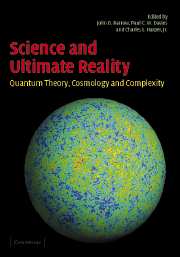Book contents
- Frontmatter
- Contents
- List of contributors
- Foreword
- Editors' preface
- Preface
- Acknowledgments
- Part I An overview of the contributions of John Archibald Wheeler
- Part II An historian's tribute to John Archibald Wheeler and scientific speculation through the ages
- Part III Quantum reality: theory
- 3 Why is nature described by quantum theory?
- 4 Thought-experiments in honor of John Archibald Wheeler
- 5 It from qubit
- 6 The wave function: it or bit?
- 7 Quantum Darwinism and envariance
- 8 Using qubits to learn about “it”
- 9 Quantum gravity as an ordinary gauge theory
- 10 The Everett interpretation of quantum mechanics
- Part IV Quantum reality: experiment
- Part V Big questions in cosmology
- Part VI Emergence, life, and related topics
- Appendix A Science and Ultimate Reality Program Committees
- Appendix B Young Researchers Competition in honor of John Archibald Wheeler for physics graduate students, postdoctoral fellows, and young faculty
- Index
9 - Quantum gravity as an ordinary gauge theory
from Part III - Quantum reality: theory
Published online by Cambridge University Press: 29 March 2011
- Frontmatter
- Contents
- List of contributors
- Foreword
- Editors' preface
- Preface
- Acknowledgments
- Part I An overview of the contributions of John Archibald Wheeler
- Part II An historian's tribute to John Archibald Wheeler and scientific speculation through the ages
- Part III Quantum reality: theory
- 3 Why is nature described by quantum theory?
- 4 Thought-experiments in honor of John Archibald Wheeler
- 5 It from qubit
- 6 The wave function: it or bit?
- 7 Quantum Darwinism and envariance
- 8 Using qubits to learn about “it”
- 9 Quantum gravity as an ordinary gauge theory
- 10 The Everett interpretation of quantum mechanics
- Part IV Quantum reality: experiment
- Part V Big questions in cosmology
- Part VI Emergence, life, and related topics
- Appendix A Science and Ultimate Reality Program Committees
- Appendix B Young Researchers Competition in honor of John Archibald Wheeler for physics graduate students, postdoctoral fellows, and young faculty
- Index
Summary
Why quantum gravity?
In the twentieth century we gained an enormous amount of knowledge about the basic fundamental laws that govern the physical world. We can summarize this knowledge by saying that particles experience four kinds of forces: electromagnetic, weak, strong, and gravitational. For the first three we have a quantum mechanical description but for gravity we have Einstein's theory, which is rather difficult to quantize. It is not logically consistent to describe particles with quantum mechanics but spacetime with classical physics since matter causes spacetime curvature. So we should be able to consider a particle which is in a quantum mechanical superposition of two states with different positions. These particles should create a gravitational field which contains a similar superposition. This is possible only if the gravitational field itself is quantized. Finding a theory of quantum gravity is not just a question of mathematical consistency, there are physical processes that we cannot describe with current theories. The most notable of these is the beginning of the universe, the initial moments of the Big Bang. We need a quantum gravity theory to be able to understand that moment. The moment is very important since it sets the initial conditions for the subsequent classical evolution of spacetime. Quantum gravity is important when the typical energies of the particles involved are very high. We know from the form of Einstein's action that quantum gravity must be important when particle energies are close to 1019 GeV, which is called the Planck energy.
- Type
- Chapter
- Information
- Science and Ultimate RealityQuantum Theory, Cosmology, and Complexity, pp. 153 - 166Publisher: Cambridge University PressPrint publication year: 2004
- 2
- Cited by



